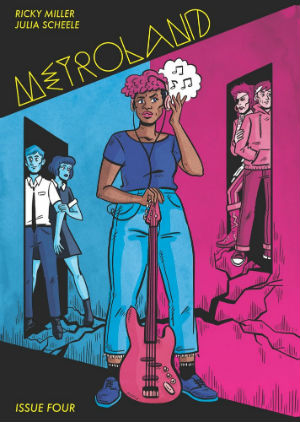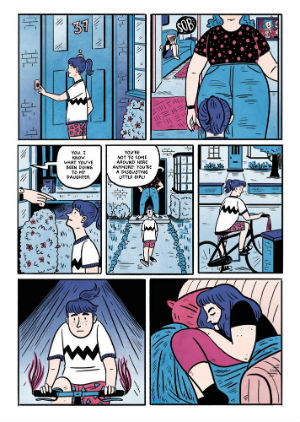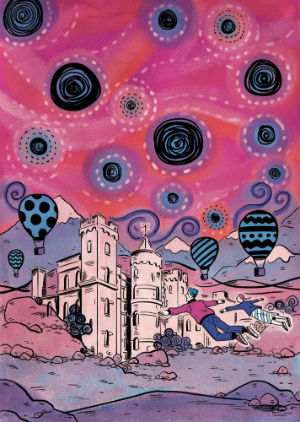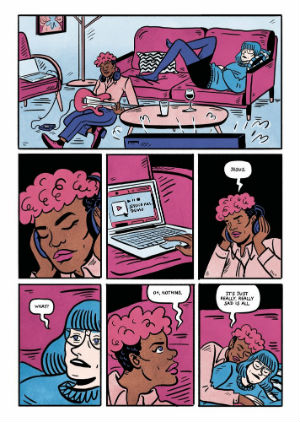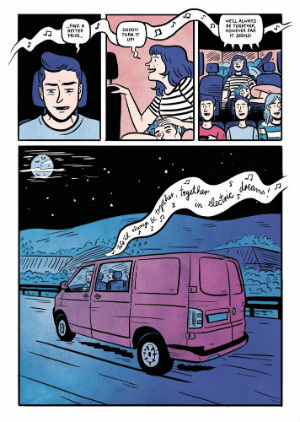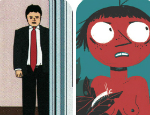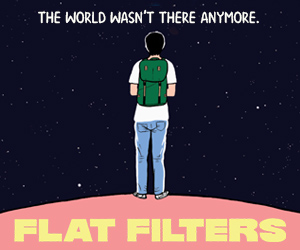Defining Ricky Miller and Jules Scheele’s Metroland is not a simple task, stubbornly defying as it does any easy categorisation. This grand and sweeping (yet also very human and down to earth) epic fuses time travel, social commentary, drama, the music industry, fantasy, conspiracy thriller and more than a hint of autobio in its pages. But that simple, seemingly throwaway line above from Metroland #4 probably best encapsulates the heart of this long-time Avery Hill Publishing staple.
Linking the Broken Frontier Award-winning publisher’s current output to its very early days (a prototype version of Metroland ran in serialised form in their very early zines and anthologies many years back before being completely rebooted for this incarnation) Metroland runs through their publishing history from the very beginning in one form or another. That’s perhaps hardly surprising given that it was created by AHP co-publisher Ricky Miller but, along the way, it’s included back-up strips from some of the wider number of Avery Hill artists including B. Mure and Owen D. Pomery (who provides highly atmospheric visuals in #4’s short supplementary story), and on occasion has felt as much an embodiment of their collaborative ethos as former flagship anthology Reads did.
Ostensibly the first arc of Metroland has centred on the band Electric Dreams, attempting to make it on the London music scene. But in reality that’s just the tiniest part of the story. Metroland is a particularly difficult book to review. So much of its narrative struture and plot points unfold in such a way that the reader should have the first option of making those discoveries themselves, gradually piecing together the elements of its complex, involved and often chronologically displaced narrative.
To strip it back to its core premise, Metroland explores the strange relationship between Electric Dreams bandmates Ricky Stardust and Jessica Hill, their mysterious disappearances and temporally inconsistent encounters, and just what is going on during Stardust’s frequent unexplained absences. Throw in the book’s subtle but alternate timeline, the apparent oncoming end of the world, a (rather prescient) corrupt President, historical meddling, unlikely musical cameos and the surreal locale of the titular Metroland outside of time and space, and you get the idea of what a multi-faceted piece of storytelling this is.
With #4 so much of what Miller has been setting up – or perhaps interweaving would be a better term – becomes far more apparent. Metroland has consistently rewarded re-reading seeded, as it is, with hints, clues and teasers that are now paying off for the long-term audience. The intricacies of the overarching plot gain some clarity but with more questions asked and some ominous foreshadowing there’s plenty here to keep us eagerly waiting for the next arc. Miller’s dialogue retains its snappy and often worldweary wit while the pop cultural Easter Eggs (a neat one-panel X-Men issue homage perfectly executed by Scheele is a delight this time around) add an extra level of fun for the careful reader.
Scheele’s art has evolved over the four years of this inital storyline with, notably, a line in expressive visual characterisation that says as much about the characters and their worldviews as their words do. Panel-to-panel storytelling is perfectly paced to emphasise the key dramatic plot twists but it’s the quieter, character-led sequences where Scheele excels in immersing the reader in the cast’s world and reminding us of their very human frailties. Scheele’s use of colour is also spellbindingly entrancing when needed. Just check out our visit to the extradimensional Metroland in #4 for evidence of that.
In many ways Metroland feels like the hidden gem of Avery Hill’s publishing output over the last few years. One of their strongest narrative offerings with a creative partnership excelling in playing to each other’s strengths but one that seems to have flown under the radar of many. Clearly its scheduling delays didn’t help it, with these first four issues taking four years and perhaps, to a degree, derailing its momentum somewhat. But if its serialised delivery put you off previously then you have no excuse not to pick up all four parts of this first arc now. Intricately plotted and gorgeously illustrated, Metroland is a revelatory reading experience in one sitting. Let’s hope that second arc arrives sooner rather than later and we get to revisit these characters and the mysteries surrounding them again in the very near future.
You can purchase Metroland from Avery Hill Publishing’s online store here as either individual issues or a special offer set of all four issues for £15.00.
For regular updates on all things small press follow Andy Oliver on Twitter here.





